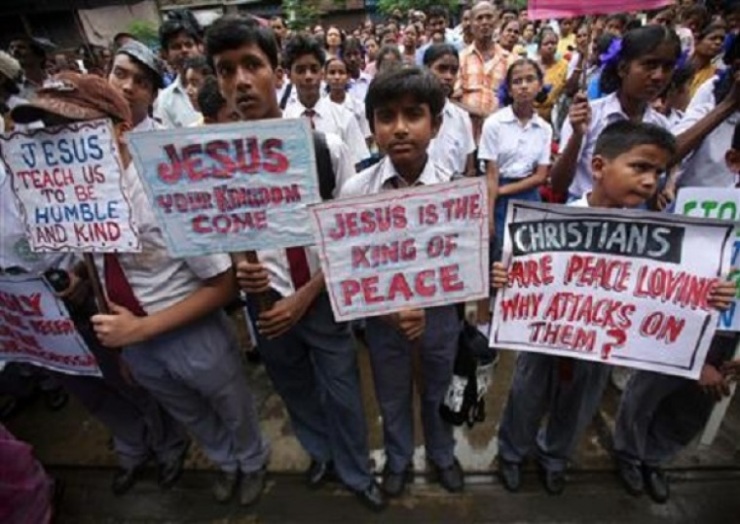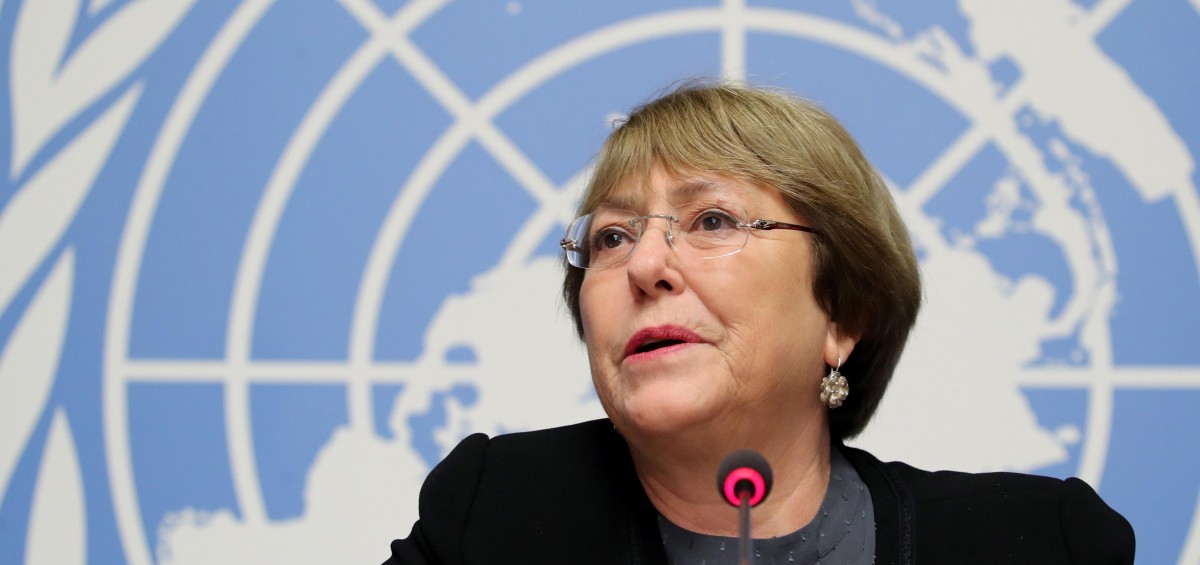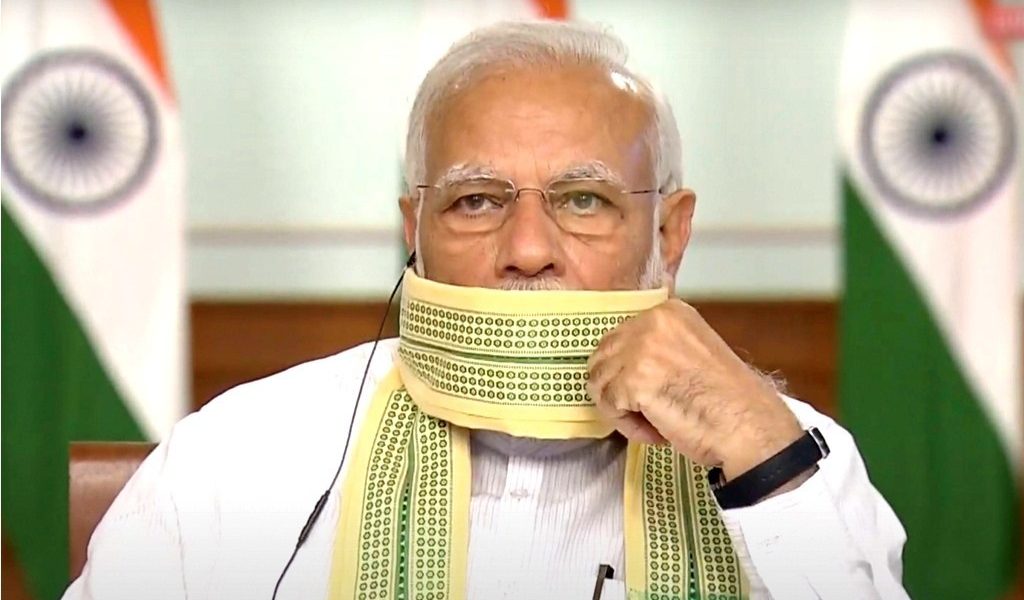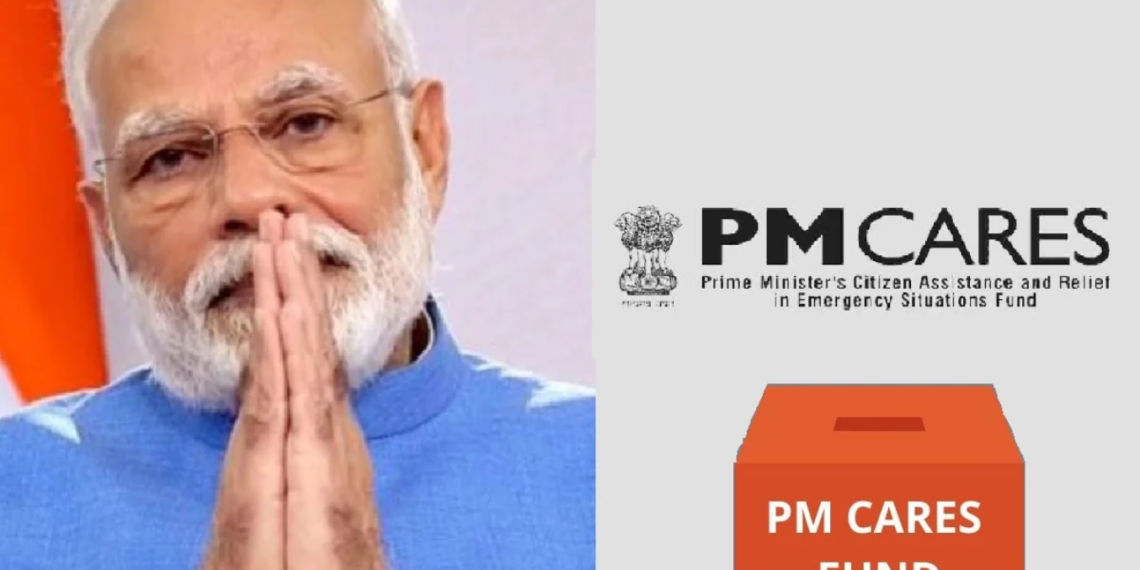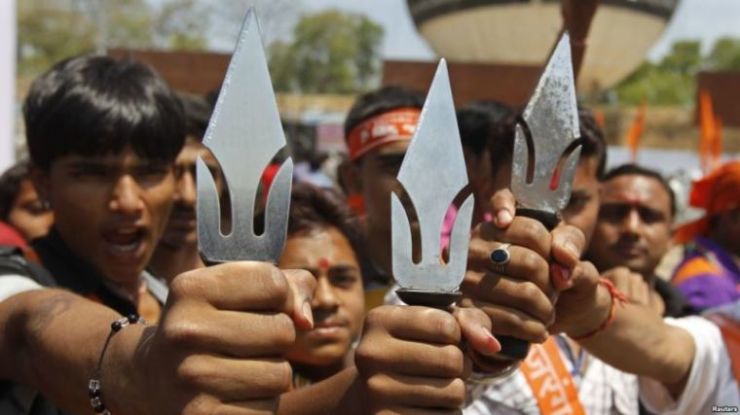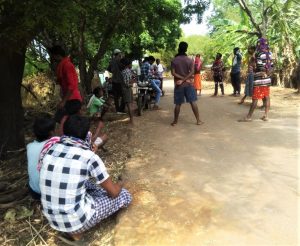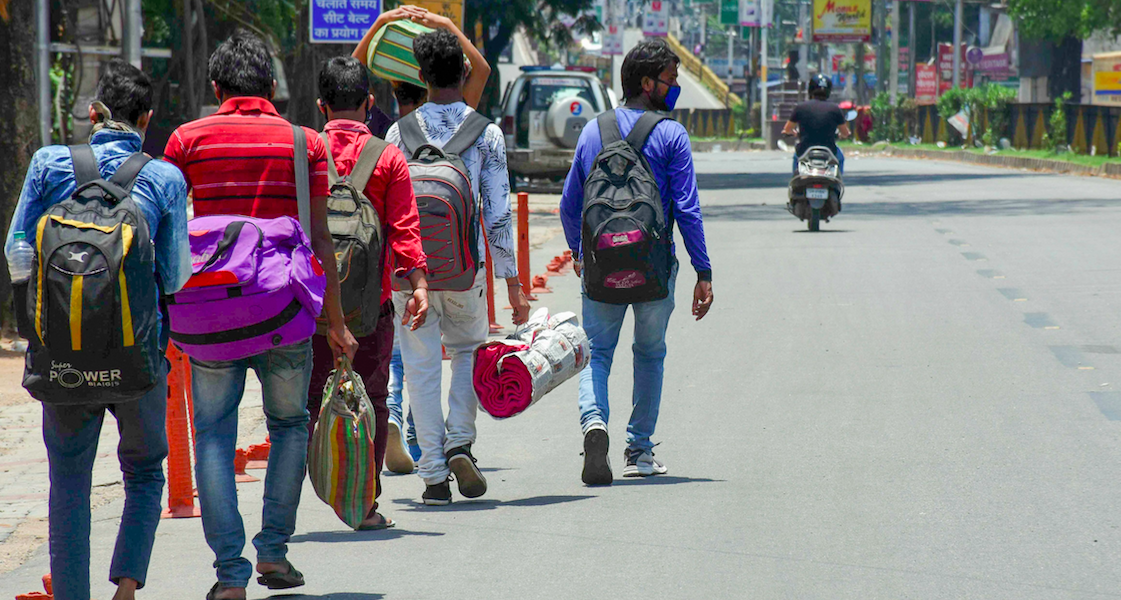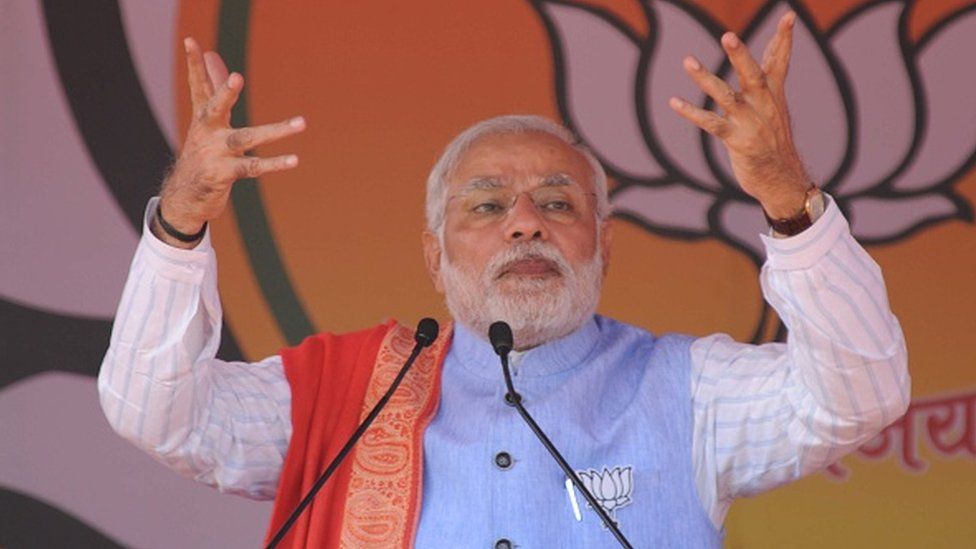Tribal animists beat pastor, threaten to destroy vocal cords to halt further evangelism
School children listen to a speech by a Christian leader during a protest rally in the eastern Indian city of Kolkata August 29, 2008. (Photo: Reuters/Jayanta Shaw) After demolishing a pastor's house and driving his family into the jungle, tribal animists in central India severely beat the Christian leader, threatening to destroy his vocal cords so he can no longer preach. Nearly a month after tribal animists expelled the Christian family from Bilood village in Madhya Pradesh state and destroyed their home, tribal animists ambushed Pastor Lalu Kirade as he returned from a grocery store. Led by a man identified only as Laxman, seven individuals beat, choked, and pelted the pastor with a stone, Kirade told Morning Star News. "They had sprung on me like a pack of wild dogs," the pastor recalled. "They told me to call upon my God to come and rescue me." "My head began to spin with the sudden strike. Blood started to ooze out of the injury, and I fell on the ground. I heard the men shouting at Laxman's wife for hitting me with a stone. They said they had planned to hit me in a way that I would not bleed. They scolded the women for not doing as planned." Laxman's niece
COVID-19 Emergency Powers Shouldn’t Be Weaponised to Suppress Dissent: UN Human Rights Chief
Shooting, detaining, or abusing someone for breaking a curfew because they are desperately searching for food is clearly an unacceptable and unlawful response, the UN body chief Michele Bachelet said. United Nations High Commissioner for Human Rights Michele Bachelet cautioned governments against violating basic human rights granted to people under the guise of adopting emergency powers to fight the COVID-19 pandemic. In a statement earlier this week, Bachelet said that emergency powers should not be weaponised by governments to “quash dissent, control the population, and even perpetuate their time in power”. “They should be used to cope effectively with the pandemic – nothing more, nothing less,” she said on April 27. Referring to reports of use of excessive force to force citizens to abide with lockdown rules, she noted that most violations have often been committed against people belonging to the poorest and most vulnerable segments of population. “Shooting, detaining, or abusing someone for breaking a curfew because they are desperately searching for food is clearly an unacceptable and unlawful response. So is making it difficult or dangerous for a woman to get to hospital to give birth. In some cases, people are dying because of the inappropriate application of measures that have
PMO Refuses to Give Details on PM-CARES, Citing Controversial SC Statement
The PMO also refused information regarding the implementation of the national lockdown and how this decision was reached. The Prime Minister’s Office (PMO) has refused to make documents related to the PM-CARES Fund public. The fund was set up to receive financial aid from the public to fight the coronavirus pandemic. In addition, the PMO has also refused to make public details of high-level meetings on COVID-19 and on the decision to implement a lockdown, the correspondence between the Ministry of Health and the PMO in this regard, and files related to COVID-19 testing. It is significant to note that the PMO has not refused to share information in a straightforward manner but among many reasons, cited a controversial statement made by a bench of the Supreme Court. A resident of Greater Noida and environmental activist, Vikrant Togad, had filed an application under the Right to Information (RTI) Act on April 21, 2020 seeking information on 12 points from the PMO. However, the PMO hurriedly sent a reply merely six days later, on April 27, refusing to furnish information citing that the application contains multiple requests on numerous and varied topics, as a result of which the information could not be provided. Also read: PM
When Government Committee Said ‘No CSR’ for PM Relief Funds, Why the Sop for PM CARES?
Contribution to central government funds runs contrary to the philosophy of CSR which is the leveraging of innovation of the private sector to deliver public goods and services. On March 28, 2020, as the incorporation of a new relief fund was announced by the Prime Minister’s Office (PMO), the Ministry of Corporate Affairs swiftly issued a general circular which clarified that any contribution made to the new fund, that is the PM CARES Fund shall qualify as CSR (Corporate Social Responsibility) expenditure. The circular’s impact is far greater impact than simply encouraging profit-making companies to supplement the government’s resources − it allows for uncapped contributions to a central government fund in direct contradiction of reports by committees specifically constituted to evaluate CSR legislation. CSR became statutorily mandated after the enactment of the Companies Act, 2013. Philanthropic activities that companies had been undertaking voluntarily were turned into a mandatory statutory provision. It required all companies that met a specified financial threshold to expend 2% of their average net profit towards CSR activities. The Act identified areas such as education, eradication of malnutrition, sanitation, etc. that qualified as CSR expenditure. Companies were required to constitute an internal CSR committee to formulate policy along the lines of the identified
Hindu nationalists falsely accuse Christians of mob lynching
Hindu nationalists have falsely accused Christian missionaries of being behind the lynching of two Hindu priests, placing the country's already-persecuted Christian minority further at risk. UCA News reports that after two Hindu priests and their driver were murdered by a mob in Gadchindhali village in Maharashtra's Palghar district in April, Christians were quickly blamed for the killing despite no clear evidence that any believers were involved. The three individuals were on their way from Mumbai's Kandivili to Silvassa to attend a funeral when they were stopped by a vigilante group that was set up by locals to patrol during the night, the Times of India reported. After questioning the men they suspected of being kidnappers or robbers, the mob pelted stones at them and later beat them with sticks. Though police attempted to intervene, the mob killed the three travelers. The police have detained over 100 people and nine minors in connection with the lynching. Days later, Rakesh Sinha, a member of parliament from the Hindu nationalist Bharatiya Janata Party and a senior spokesperson for the Hindu extremist Rashtriya Swayamsevak Sangh, claimed on national television that Christian missionaries and the Communist Party of India were behind the murders, UCA News reports. Without providing any evidence for his allegation,
Christian leaders say Supreme Court’s ruling is limiting their right to manage medical institutions
On April 29, the Supreme Court of India ruled that medical schools run by religious minorities like Christians and Muslims do not have the right to admit medical degree students of their choice. The court said all medical schools should admit students based on their merit list obtained through the National Eligibility cum Entrance Test (NEET) in order to have a single unified admitting process. The constitution of India allows religious minorities to establish institutions and manage them for the betterment of their communities, which also gives them the right to admit students of their choice. The court mentioned that the constitutional right is "not violated by provisions for the uniform entrance examination to all medical educational institutions under undergraduate level and postgraduate level through such designated authority." For Christian leaders, the court order is limiting the rights of religious institutions as they cannot admit a student for a medical degree if he or she has not cleared the NEET. Father Paul Parathazham, director of St. John's Medical College in Bengaluru, told UCA News that medical colleges run by churches have their own eligibility examinations that are conducted in a transparent way to select students. After the court ruling, Father Parathazham admitted that such procedures are
Christian Families Summoned, Beaten and Threatened with Death in Chhattisgarh, India
Animists in central India last week told five Christian families they would lose their harvest lands unless they returned to their tribal religion and beat them when they refused, sources said. When the families answered a summons to a meeting with Salhephal village leaders in Bastar District, Chhattisgarh state on Tuesday (May 5), they found the tribal elders estimating the value of their lands, pastor Sirisguda Ramdhar told Morning Star News. The Christians had forbidden a tribal animist leader, Dulla Poyami, to perform tribal worship on their land, he said. “The village leaders told the Christians, ‘You are not partaking in our tribal rituals, and so we cannot allow you to profit from your agricultural lands,’” Pastor Ramdhar told Morning Star News. The Christians told them the lands were registered in their names, and that they were working hard to earn their bread, he said. “We follow our faith but have never been a burden on this village or to our kinsmen – you cannot snatch away our lands,” they told the tribal elders, according to the pastor. “Even before they spoke any word further, the elders stood up and stormed at Christians Madda Poyami and Badda Poyami,” he said. They began beating the two
FIACONA Asks the President and the World Bank to Closely Monitor the Funds Sent to India for COVID-19 Relief
May 13, 2020, Washington, DC. The Federation of Indian American Christian Organizations (FIACONA) and Save The Persecuted Christians (STPC) jointly sent a letter to President Trump and Mr. David Malpass, the President of World Bank Group raising concerns about the COIVD-19 related policies of the government of India and the deployment of 1 Billion US Dollars lent by the World Bank. The letter addresses several systemic flaws in the Hindu nationalist government's approach to the problem. We are concerned that millions of people are being left out of the programs meant to help the people during this crisis. Several reports indicate that religious minorities are being unfairly singled out by the government in many places as a part of pandemic response. Though Christians and other religious minorities are suffering due to government actions, they are not the only victims. Various sections of economically vulnerable people are greatly suffering due to these fundamentally flawed attitudes of Mr. Modi's Hindu nationalist government. Because the core constituents of the Hindu nationalist party are always religiously upper-caste Hindus, linguistically Hindi speaking, and economically middle class, government policies seem to be crafted for them instead of the whole population.The evidence of it was loud and clear last month when
In Jharkhand, a Mockery of ‘Right to Food’ as Lockdown Relief Measures Fail to Deliver
Corruption and inadequacy of implementation has meant that some of the most vulnerable people have gone hungry since the lockdown. In Bhandariya block of Jharkhand’s Garhwa district, 76-year-old Lachhu Lohra sits alone. “My wife died without eating anything,” he says. Somaria Devi’s demise, on April 4, is the third starvation death in the state in April alone. Her family had not had anything to eat for three days before her death. There was nothing in the house.According to Census 2011, about 40% of Garhwa district’s population comprises people belonging to the Scheduled Castes (SC) and Scheduled Tribes (ST). Of them, 8,611 families are categorised under the Particularly Vulnerable Tribal Groups (PVTG) who are one of the most marginalised social groups in the state. Somariya Devi’s husband Lachhu Lohra. Photo: Author provided In addition to Garhwa, at least three more hunger-related deaths were reported from across the state in the lockdown period – differently-abled Meena Marandi in the Gomaria block of Bokaro district and Upasi Devi from the Gola block of the Ramgarh district. None of these families had a ration card. Also read: Six Charts Show That India Needs to (and Can Afford to) Universalise PDS The worsening hunger situation is not limited to a few families only. In socio-economically weaker
Prime Minister Modi’s Office in a Damage Control Mode
May 15, 2020. Washington DC. Within twenty-four hours of sending the letter to the World Bank expressing concerns over the way in which COVID 19 related funds, including the nature and functioning of a newly created “PM CARES FUND” in India are handled, the Prime Minister’s Office (PMO) went into a damage control mode and made a U-Turn by making few details public. A few weeks ago, the PMO refused to divulge any information on this mysterious “Prime Minister Cares” fund created in a hurry while there is “Prime Minister’s Relief Fund” already available for the same purposes. On Monday, May 11, Federation of Indian American Christian Organizations (FIACONA) and Save the Persecuted Christians (STPC) sent a multifaith letter to the World Bank expressing concerns over how COVID 19 related funds are handled by the Indian government. Thirty-four different organizations signed it. The letter suggested the Bank to consider setting up an independent committee of eminent people in India to monitor the $ 1 Billion COVID 19 related relief package approved by the World Bank. On May 12, Tuesday night, the PMO reversed its position and issued a statement, saying the PM Cares Fund will spend $4.1 Billion (31,000 Crores Rupees) on COVID





